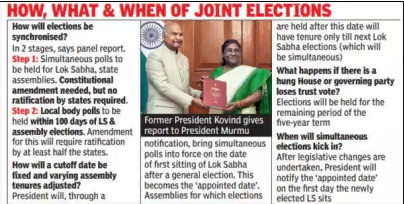Ahmedabad
(Head Office)Address : 506, 3rd EYE THREE (III), Opp. Induben Khakhrawala, Girish Cold Drink Cross Road, CG Road, Navrangpura, Ahmedabad, 380009.
Mobile : 8469231587 / 9586028957
Telephone : 079-40098991
E-mail: dics.upsc@gmail.com

Simultaneous Elections – Kovind Panel report
News: Recently, the Kovind Panel Report on simultaneous elections was submitted to the President Droupadi Murmu.
Background:
The committee suggested that elections to the Lok Sabha and state Assemblies
should be held at the same time.
Later, elections to local bodies should be synchronized too, so that they are held
within 100 days of the simultaneous state and national elections.
What is the Kovind Panel on Simultaneous Elections?
The Union government on September 2, 2023 had constituted a committee
under the headship of former President of India Ram Nath Kovind to look into the feasibility of ‘one nation one election’.
The Committee was headed by Ramnath Kovind. The members include- Home Minister Amit Shah, former Leader of Opposition in the Rajya Sabha Ghulam Nabi Azad, former Finance Commission chairperson N K Singh, former Lok Sabha secretary-general Subhash C Kashyap, senior advocate Harish Salve and former Chief Vigilance Commissioner Sanjay Kothari.
Key recommendations:
The committee has suggested 15 amendments to the Constitution of India– in the form of both new provisions and changes to existing provisions- to be carried out through two Constitution Amendment Bills.
First constitution amendment bill
It deals with the transition to a simultaneous election system, and the procedure for fresh elections to Lok Sabha or a state Assembly before the expiration of their stipulated five-year term.
The Bill can be passed by Parliament without the requirement for consultation with state governments or ratification by state Assemblies.
What are the provisions of the bill?
Insertion of Article 82A: It will establish the process by which the country will move to a system of simultaneous elections for Lok Sabha and state Assemblies.
Provision of Article 82A (1)
The President will issue a notification bringing Article 82A into effect, on the date of the first sitting of the House of the People after a general election. The date of this notification “shall be called the Appointed date”.
Provision of Article 82A (2)
All the Legislative Assemblies constituted in any general election held after the appointed date shall come to an end on the expiry of the full term of the House of the People.
Provision of Article 82A (4)
If the ECI believes that elections to any legislative assembly cannot be conducted simultaneously, “it may make a recommendation to the President, to declare by an Order, that the election to that Legislative Assembly may be conducted at a later date
Provision of Article 82A (5)
Even in cases where the state Assembly election is deferred, “the full term of the Legislative Assembly shall end on the same date as the end of the full term of the House of the People constituted in the General Election”
Amendment to Article 327
Article 327 gives Parliament the power to make laws relating to elections to Lok Sabha, Rajya Sabha, and state legislatures, including the preparation of electoral rolls and delimitation of constituencies.
The committee has recommended that the power of Parliament under Article 327 should be expanded to include “conduct of simultaneous elections” as well.
Amendments to ensure simultaneous elections when Lok Sabha or state Assembly is dissolved before ‘full term’ ends
Amendment of 83(2) (Duration of Houses of Parliament) and 172 (1) (“Duration of the State Legislatures”): The committee has recommended that the five-year duration of the House of people and state legislatures should be referred to as “the full term”.
Amendments to Articles 83(3) and 172(3): If Lok Sabha or a state Assembly is dissolved before the expiry of the full term, the remaining period will be referred to as the ‘unexpired term’.
Addition of Articles 83(4) and 172(4): Lok Sabha or state Assembly that replaces the previously dissolved Lok Sabha or state Assembly will serve only for the remaining ‘unexpired term’.
2nd constitutional amendment bill
It deals with municipal and panchayat elections.
It needs to be ratified by at least half of the state legislatures in the country before it can be passed by the Parliament.
Article 324A: It would empower the Parliament to make laws to ensure that municipality and panchayat elections are held simultaneously with the General Elections (to Lok Sabha and state Assemblies).
Article 325(2): It will create a single electoral roll for each territorial constituency to the election of house of people, legislative assembly of state or to a municipality/panchayat.
No-Confidence Motion Timing:
o To prevent frequent disruptions, the committee recommends that a no-confidence motion against the government can only be moved once in a year. This aims to ensure stability and continuity.

Address : 506, 3rd EYE THREE (III), Opp. Induben Khakhrawala, Girish Cold Drink Cross Road, CG Road, Navrangpura, Ahmedabad, 380009.
Mobile : 8469231587 / 9586028957
Telephone : 079-40098991
E-mail: dics.upsc@gmail.com
Address: A-306, The Landmark, Urjanagar-1, Opp. Spicy Street, Kudasan – Por Road, Kudasan, Gandhinagar – 382421
Mobile : 9723832444 / 9723932444
E-mail: dics.gnagar@gmail.com
Address: 2nd Floor, 9 Shivali Society, L&T Circle, opp. Ratri Bazar, Karelibaugh, Vadodara, 390018
Mobile : 9725692037 / 9725692054
E-mail: dics.vadodara@gmail.com
Address: 403, Raj Victoria, Opp. Pal Walkway, Near Galaxy Circle, Pal, Surat-394510
Mobile : 8401031583 / 8401031587
E-mail: dics.surat@gmail.com
Address: 303,305 K 158 Complex Above Magson, Sindhubhavan Road Ahmedabad-380059
Mobile : 9974751177 / 8469231587
E-mail: dicssbr@gmail.com
Address: 57/17, 2nd Floor, Old Rajinder Nagar Market, Bada Bazaar Marg, Delhi-60
Mobile : 9104830862 / 9104830865
E-mail: dics.newdelhi@gmail.com